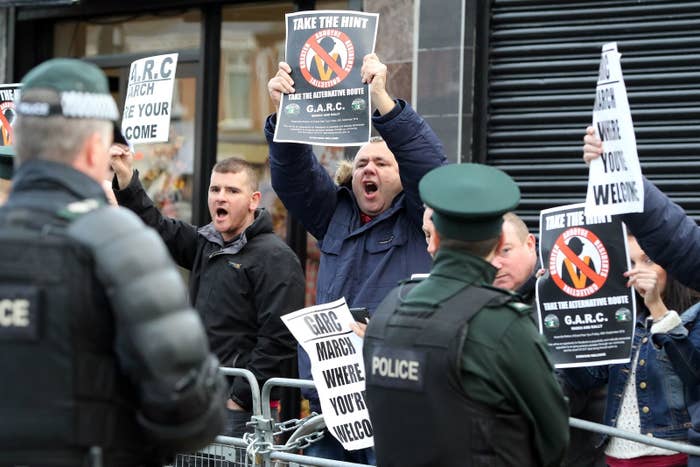
Theresa May will seriously harm relations between Catholics and Protestants in Northern Ireland if she enters into a “dodgy deal” with the Democratic Unionist Party on loyalist marching rights, local politicians have warned.
Two Northern Irish politicians told BuzzFeed News that such an arrangement would compromise the British government’s neutrality on the peace process and have urged May not to “undercut” Northern Irish people in order to stay in power.
Speaking to BuzzFeed News, Dolores Kelly MLA, a nationalist politician from the Social Democratic and Labour Party, said: “No government should entertain the notion of invading that space for a dodgy deal with the DUP under any circumstances."
The Orange Order, a Protestant fraternal organisation with many links to the DUP, is perceived by many as anti-Catholic and is known for its controversial marches in Catholic areas of Northern Ireland that often prove flash points for sectarian violence.
In light of the DUP’s pact to prop up the Conservative party, the Order has called on the DUP to use its position of influence to reduce restrictions on their marches.
The DUP has historically had a close relationship with the Order, and its MP David Simpson is a member of the group. In a statement the Portadown branch of the Orange Order said: “Portadown District LOL [Loyalist Orange Lodge] notes the outcome of the recent general election with interest. We would like to congratulate fellow Bro. David Simpson and all the other unionist representatives.
“We note the invitation from the Prime Minister to the DUP to support her government. We trust that the parading issue especially in Portadown will be high on the agenda for the new government.”
The statement continues: “It is clear that the endeavour of the orange family to maximise the unionist vote paid dividends and consequently the DUP has been given the opportunity and responsibility to deliver for the people of Northern Ireland. We trust that they are successful in promoting the values of the Unionist People and the Orange fraternity. We wish them well in the weeks and months that lie ahead.”
The Portadown Order branch has been at the centre of controversy for decades in Northern Ireland due to its desire to march through the Garvaghy Road. The area is primarily home to Catholic residents and the march is seen by many locals as a deliberate act of sectarian intimidation. The attempts to march have often resulted in riots between marchers and local Catholics. In 1998, three young boys were killed in riots, after a petrol bomb was thrown into their home.
Kelly said: “Parading disputes can only be resolved through direct, meaningful and sustained dialogue at a local level. The Orange Order knows that well. This attempt to undercut residents will not work."
She added: “For as long as the DUP has a hold on the Conservative party, they cannot and will not act as neutral arbiters in affairs which the DUP has an interest in.”
The leader of the Northern Irish Green party, Steven Agnew, echoed the concerns, telling BuzzFeed News: “Experience has shown that community-contested parading issues are best resolved at a community level. It's unrealistic to expect a Westminster government to consider a single parading matter.
“I would hope that the DUP represent all within their constituencies as part as any future arrangement.”
Following news that the Conservatives and the DUP plan to enter a pact in order to prop up the former’s minority government, a number of politicians in Northern Ireland across the political spectrum have expressed concern that the British government can no longer be neutral on Northern Irish issues.
Due to the peace process, the British government is required to be neutral on Northern Irish issues. Negotiations are currently ongoing to try and save power-sharing in Northern Ireland after Stormont collapsed in January, when Sinn Féin pulled out of power-sharing with the DUP.
Following news of the DUP-Conservative pact, the Irish prime minister Enda Kenny said he had contacted Theresa May to express his concern that no such deal should put the Good Friday Agreement at risk.
Sinn Féin leader Gerry Adams has called for a new independent chair for the power-sharing talks, saying the DUP-Conservative pact has compromised the British government’s neutrality. The Republican party’s concerns have been echoed by the nationalist Social Democratic and Labour Party, as well as the anti-sectarian Alliance party, which has also demanded a new chair for the talks.
The Good Friday Agreement was signed in 1998, bringing an end to decades of conflict between Catholic and Protestant communities. The accord binds the British government to showing “rigorous impartiality” on Northern Irish issues as a condition of the peace process.
